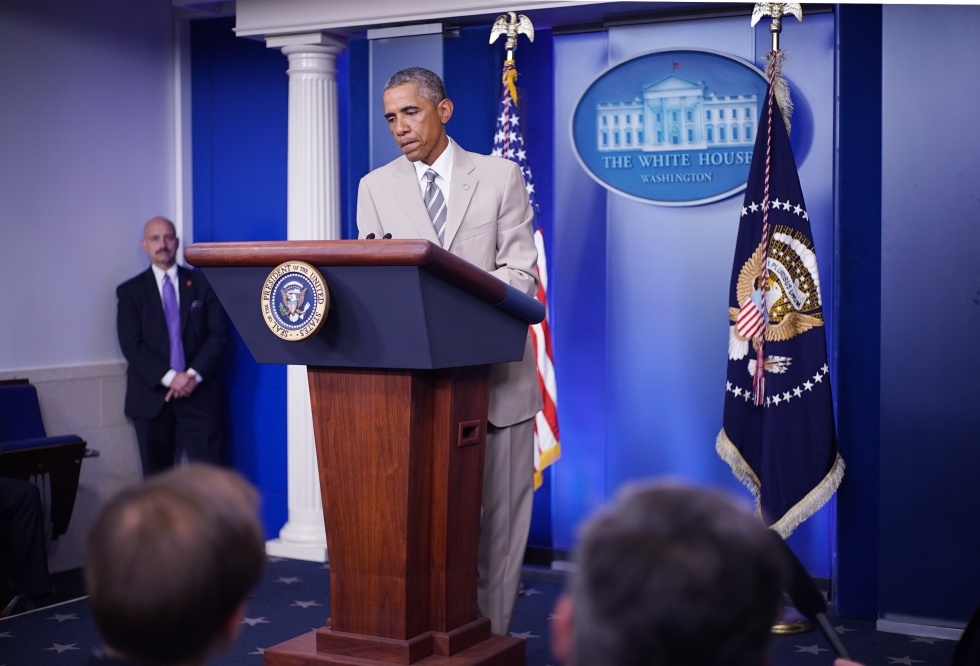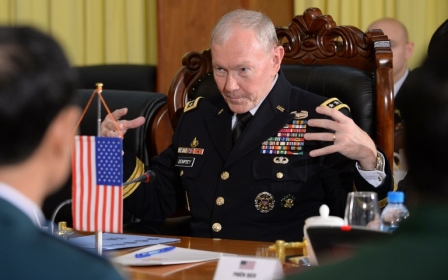Why has the US got cold feet in the Middle East?

Analysts and politicians have been criticising the Obama administration regarding its foreign policy towards Syria, Iraq and the Middle East as a whole. One wonders why the US is so reluctant to take decisive action in the Middle East, especially against the Islamic State (IS)?
This group is even more notorious than al-Qaida (AQ) and is confined to a specific territory, unlike AQ which is not defined by territory.
Middle East observers tend to be focused on the complexities and intricate details of this chaotic bloody region; the world is actually a bigger place and not necessarily any less complex or conflict-ridden. One needs to focus out of the Middle East to understand US reluctance.
While constant headlines and live feeds are made about IS as it conquers new land. Pro-Russian rebels in Ukraine are still on the run causing havoc, the Crimea is still occupied by Russia and Putin is still resilient in his nostalgic ambitions. The Russian occupation of the Crimea took the world by surprise, though some observers have been warning of Ukraine’s jeopardy years in advance.
The fact that Nato has been steadily expanding was now, more than ever, worrisome to Russia. Prior to the crises, Ukraine has been closely cooperating with Nato for years, much more so than other countries. This, no doubt, raised eyebrows in Moscow. Russia would have found it unacceptable that Nato would be sitting directly on its border.
The Obama administration can threaten Russia with sanctions, but it can only go as far as its European allies are willing to go.
Tensions between Russia and the EU are harmful for both, perhaps more so for the EU which depends on its energy from Russia. It is no surprise that German chancellor, Angela Merkel, is saying that Ukraine is free to go to Russia’s “Eurasian Union”. Moreover, the Hungarian prime minister is seeking an alliance within EU member states in order to stop sanctions against Russia.
Whether it was Nato’s “true strategic and modernised partnership” that the Nato-Russia Council (NRC) aimed towards in 2010’s Lisbon conference, or Zbigniew Brzezinski’s (former US national security adviser and professor of international relations) 2013 “strategic vision”, which envisioned the west as more vibrant and enlarged with the inclusion of Russia; the perception of future western-Russian relations were, at times, optimistic.
Russia’s political posture is confrontational and any compromise made towards Russia may not be seen by Moscow as wise, but more as backing down. Marking the threat as real, US Air Force General Philip Breedlove, Nato’s supreme allied commander in Europe has said to German newspaper Die Welt; that Nato countries should not exclude the possibility of a Russian invasion of Ukraine.
Pivot to Asia
Not any less important; or perhaps more important, is China, the most populated country in the world, an economic powerhouse, which is making huge technological advances. China’s power today is no mere speculation as it was years and decades ago. China is clearly flexing its muscles in its region, and is more assertive in its territorial conflicts in the South China Sea. The conflicts over islands and maritime is raising tensions with neighbouring countries, especially with the Philippines and Vietnam.
In May this year, Chinese vessels and Vietnamese navy ships collided in the South China Sea, as Chinese vessels were trying to set up an oil rig in an area claimed by both countries. Tensions rose to alarming levels and sparked anti-China riots in central and southern Vietnam. Months later, in August, General Martin Dempsey, chairman of the US joint chief of staff, visited Vietnam, making him the highest ranking US military officer to visit since 1971. He commented on the possibility of lifting the 30-year ban on sales of lethal weapons to Vietnam that some US policymakers have been recommending (including Senator John McCain). In a press conference he noted: “I think the maritime domain is the place of our greatest common interest right now, common security interest. My recommendation, if the ban is lifted, will be that we start with that.”
The US foreign policy in south-east Asia is marked by the “Pivot to Asia”, which is supposed to shift focus to that region and away from the Middle East. Despite verbal reassurance by the US; China sees it as an attempt to be contained. Perhaps as a response to Dempsey’s visit; days later, a Chinese jet fighter harassed a US surveillance plane flying near Hanian Island, getting extremely close to it while tilted upside down flying above it.
If the US wants to keep its global position, it will have to protect its allies from potential conflicts, and the US already has military agreements with countries in the region aided by plenty of bases and tens of thousands of troops based there.
Should the US fail to protect its allies, this gives the signal to other countries in the world, including the signal of an inability to rely on the US and the need to seek other ways/alliances for security. As China keeps growing and becomes more powerful, the US will have to be very careful not to raise tensions but be readily available to deter China as much as possible.
Drained and challenged
The US has been drained in the wars in Iraq and Afghanistan and spent trillions of dollars on them. The US has been left considerably weaker after those wars, especially the Iraq war. Moreover, US public opinion has no appetite for war and questions the purpose of heavy expenditure and sending troops abroad, especially when there are plenty of US domestic economic concerns.
The world now is very different than it was even a decade ago. Today people are more politically conscious than ever. Advances in information technology has made the global stage crowded with those who challenge states. Whether it is a venue for whistleblowers or social media that mobilises people for various causes - human rights or militant - information technology has dispersed power and given rise to new challenges that states including the US - a superpower - never had before. People power is having major effects on the global stage, keeping the policymakers up at night - especially so in the Middle East.
As Russia revives itself from the collapse of the Soviet Union and China grows (or perhaps recovers from the previous century); the US has actually become weaker, and has to extend its still unmatched power in a more conservative way. If the US pushes its hard –military- power in one area it will be more vulnerable in another and, with a more daring Russia and emboldened China, this would be a very risky venture. Moreover with regards to the Middle East, exerting power in this turbulent chaotic hard-to-predict region is expenditure with no returns guaranteed. It will simply be money and effort wasted. Furthermore, as the US is becoming less energy dependent, with the shale gas and oil revolution, there will be less need for the Middle East’s resources.
New policy and options
Obama’s speech at West Point this May perhaps marks a new era or doctrine of US foreign policy - one that sees its limits and challenges. Despite the debate the speech stirred up for good or for worse; for the Middle East its message was simple. “Invading every country that harbours terrorist networks is naive and unsustainable," Obama said in the speech. His solution was; “Today, as part of this effort, I am calling on congress to support a new Counterterrorism Partnerships Fund of up to $5 billion, which will allow us to train, build capacity, and facilitate partner countries on the front lines.” This sets the pace; the US will cooperate with other governments for its security policy in the Middle East. However this can be tricky when the US has not much to coordinate or directly cooperate with in the region and there are potentially problematic groups to the US or rival regimes. This is a major source of reluctance for involvement in Iraq and Syria.
So far the Peshmerga Kurdish forces in Iraq have been the safe choice, however if Syria and Iraq are to stabilise or push off the IS, supporting these forces won’t be enough. The US can either arm the Free Syrian Army or even push for lifting the ban on arming this group, despite its connections with other groups the US has reservations about. Alternatively, it can cooperate with Bashar Assad, which will also make Moscow more empowered aside from moral implications. Either way the US will have to find new allies in the region if it wants to continue its influence. Trying to choose partners in complex conflicts will be a source of reluctance. More so when traditional governments in the Middle East that were the first port of call for global cooperation are having their legitimacy and competence called into question.
- Mustafa Salama is a Political Analyst, Consultant and Freelance writer. Salama has extensive experience and an academic background in Middle East Affairs. Salama holds a Bachelors and Masters degrees in Political Science from the American University in Cairo.
The views expressed in this article belong to the author and do not necessarily reflect the editorial policy of Middle East Eye.
Photo: US President Barack Obama pauses while speaking at a press conference in the Brady Press Briefing Room at the White House in Washington, DC, 28 August (AFP)
New MEE newsletter: Jerusalem Dispatch
Sign up to get the latest insights and analysis on Israel-Palestine, alongside Turkey Unpacked and other MEE newsletters
Middle East Eye delivers independent and unrivalled coverage and analysis of the Middle East, North Africa and beyond. To learn more about republishing this content and the associated fees, please fill out this form. More about MEE can be found here.





